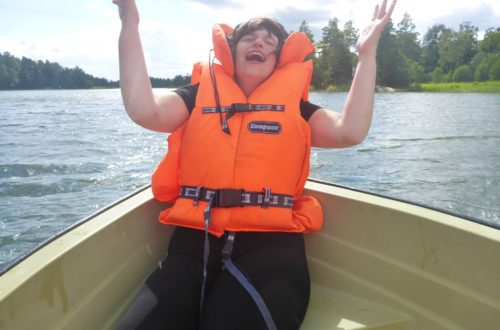AS Research
-
The Search for Sleep in Angelman Syndrome – What you need to know about Melatonin
The Search for Sleep in Angelman Syndrome. Here are some of the benefits and risks associated with using melatonin to help individuals with Angelman Syndrome sleep. Sleep disorders are a symptom of having Angelman Syndrome. Do not confuse that for meaning every individual with AS is unable to ever achieve proper sleep. This is a very complex topic, so let’s start where Angelman Syndrome research started. Effects of Low Dose of Melatonin on sleep in children with Angelman Syndrome. In this study, they used 0.3 mg of melatonin. Blood samples were withdrawn to measure individual endogenous serum melatonin levels. They noticed a significant decrease in motor activity during sleep and…
-
The Global Angelman Syndrome Registry
It is hard to believe that it has been a year since the Global Angelman Syndrome Registry was launched. This project is now the largest ever Angelman syndrome study to date, with over 450 participants, call us greedy but we want more. There are over 7000 people that “like” the Angelman Today Facebook page, we know that we can increase these numbers drastically and we want to take some time to explain to you why you should care and how your participation can shape Angelman syndrome research right now. To borrow from Rare Disease advocate Sharon Terry in her Ted talk, “Researchers don’t share. People told us you can’t herd…
-
The Low Glycemic Index Treatment for Angelman Syndrome and Prader-Willi Syndrome
By Sybille Kraft BellamyMother of Maxent, AS 14 years old. Thirteen years ago in July 2003 Maxent was diagnosed with Angelman syndrome (AS), he was 18 months old. Today he is a handsome teenager in excellent physical condition with no medical issues. Nevertheless, this was not always the case. From infancy to his toddler age he was chronically sick and he spent more time in the hospital than at home. Very quickly I had the certitude that diet should be the best accessible and fastest way to help him. Following my own observation and encouraged by Max’s pediatrician (and later by our neurologist), I started paying attention to his diet…
-
Making Shopping A Little Easier This Holiday Season
Caroline’s cart is helping to make shopping just a little easier. There are many challenges that come along with being a caretaker of an individual with special needs. Simple things like shopping for groceries are not so simple for us. The best inventions are usually created from a person’s desire to satisfy a need or to solve a problem they encounter in their own life. One set of parents did just that. Drew Ann and David Long have three children, Caroline is their middle child, she was diagnosed with Rett syndrome. The challenge came when Drew Ann went grocery shopping with her kids. She had a toddler and Caroline in…
-
Angelman Research – Baylor College of Medicine Research Discovers Potential Therapeutic for Angelman Syndrome
Baylor College of Medicine Research Discovers Potential Therapeutic for Angelman Syndrome ASF-funded research, published in Nature, proves paternal Ube3a can be activated and AS symptoms can be recovered. Dr. Art Beaudet Promising Angelman syndrome research continues to move closer toward potential clinical trials, as announced in December in a paper in Nature by Dr. Art Beaudet and his research team at Baylor College of Medicine (BCM). More research will be conducted but pre-clinical trials in AS mice have proven that the paternal copy of Ube3a can be activated and that AS symptoms can be recovered, though more testing is needed to determine exactly how the cognitive deficits associated with AS…
-
Angelman Research Update – Professor David Segal 2014
Professor David Segal heads a research laboratory at The Genome Center of the University of California Davis. A main focus of the Segal Lab is designing proteins that can bind to DNA and “turn on” or “turn off” the expression of specific genes. Such DNA binding proteins have the potential to be used in applications such as targeted gene expression therapy for conditions with a known genetic basis. For example this approach might allow people with Angelman Syndrome to make up for the loss or inactivation of the UBE3A gene on the chromosome inherited from the mother, by “turning on” or expressing the UBE3A gene inherited from the father. Professor Segal…
-
The Latest Research for Angelman Syndrome by Ed Weeber Ph.D.
By Edwin J. Weeber, Ph.D. BMC Neurosci. 2014 Jun 19;15:76. doi: 10.1186/1471-2202-15-76. The prospect of molecular therapy for Angelman syndrome and other monogenic neurologic disorders. Bailus BJ, Segal DJ1. Abstract: Angelman syndrome is a monogenic neurologic disorder that affects 1 in 15,000 children, and is characterized by ataxia, intellectual disability, speech impairment, sleep disorders, and seizures. The disorder is caused by loss of central nervous system expression of UBE3A, a gene encoding a ubiquitin ligase. Current treatments focus on the management of symptoms, as there have not been therapies to treat the underlying molecular cause of the disease. However, this outlook is evolving with advances in molecular therapies, including artificial…
-
The Latest Research for Angelman Syndrome
By Edwin J. Weeber, Ph.D. Learn Mem. 2014 Jan 16;21(2):98-104. doi: 10.1101/lm.032375.113. Activity-dependent changes in MAPK activation in the Angelman Syndrome mouse model. Filonova I1, Trotter JH, Banko JL, Weeber EJ. Author information Abstract Angelman Syndrome (AS) is a devastating neurological disorder caused by disruption of the maternal UBE3A gene. Ube3a protein is identified as an E3 ubiquitin ligase that shows neuron-specific imprinting. Despite extensive research evaluating the localization and basal expression profiles of Ube3a in mouse models, the molecular mechanisms whereby Ube3a deficiency results in AS are enigmatic. Using in vitro and in vivo systems we show dramatic changes in the expression of Ube3a following synaptic activation. In primary…
-
La Historia del Síndrome de Angelman
El Dr. Harry Angelman fue un médico Inglés quien identificó lo que hoy en día se llama Síndrome de Angelman. Nació en Birkenhead, Inglaterra. Le fascinaba el idioma y la cultura de Italia. El fue el primero quien observó trés niños no relacionados quienes demostraban síntomas similares – atrasos severos intelectuales, un modo de andar que era espasmódico y rígido, ausencia del hablar, convulsiones, y una disposición contento. Luego, duranted unas vacaciones en Italia, descubrió una pintura llamada “Un Niño con una Marioneta,” creado por el artista del Renascimiento Giovanni Francesco Caroto, en el museo Castelvecchio en Verona. La pintura le hizo pensar en los niños que eran sus pacientes, y…
-
Dr. Ronald Thibert Answers Your Questions
Dr. Ronald Thibert Answers Your Questions about LGIT? Q We have one question for Dr. Thibert. our daughter started the diet in October 2012 and after about 5 weeks she was seizures free. 3 months later her neurologist decided to lower her medication but because of this her absences came back. When is the best time to start lowering the meds? She is in ketosis and we are really careful that she gets the good ratio. A That is a great question. There is no clear answer but we usually wait 6-12 months before coming off medication after the diet begins – similar to what we would do if we added a…


